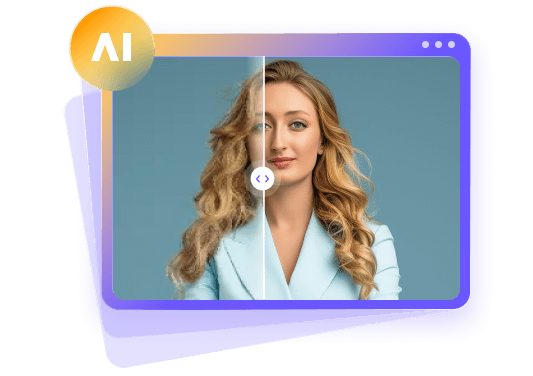Prompt AI Explained: Master AI Prompt Examples and Engineering
Are you also wondering what prompt engineering is? It is a critical skill for interacting with advanced AI models. With the evolution of AI, it has become more capable and widely used by everyone to generate eye-catching images.
In this article, we have compiled all the necessary information about creating prompts and the best prompts AI.
Part 1. What Is an AI Prompt and Its Role in Artificial Intelligence
AI prompt text refers to designing and crafting instructions or queries (prompts) that guide AI models, particularly in generating images. Here, let's explore why it matters in AI and generative models below:
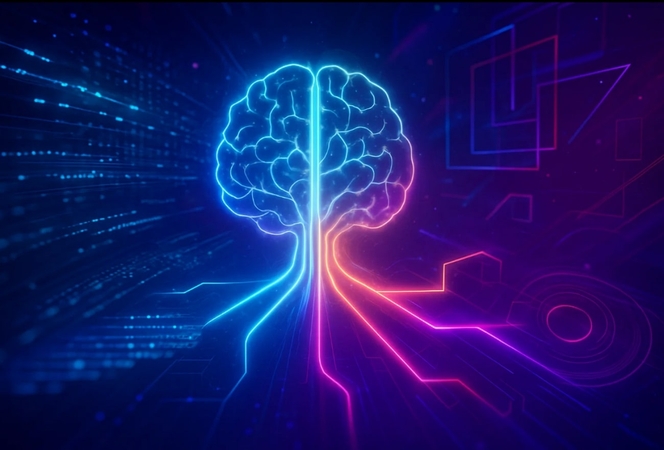
- 1. Directs Output:As prompt is the main thing, well-crafted prompts help the AI understand context and deliver more accurate, relevant, and precise content.
- 2. Efficiency and Productivity:Effective prompts minimize trial and error and reduce the need for manual corrections, ultimately saving time.
- 3. Enables Complex Tasks:Strong prompts enable AI to handle sophisticated functions, such as data extraction and content creation, that are difficult to perform manually.
- 4. Enhances Decision-Making:Effective prompts facilitate faster decision-making in various fields, including business and healthcare.
- 5. Boosts Creativity:A well-described prompt can inspire new ideas and offer novel solutions, expanding the art generation
Evolution of Prompt AI from Text Prompts to Image Generation Prompts
With the evolution of prompt design AI, there has been a shift from basic text-based instructions to advanced multimodal prompts that now shape both text and image generation. Initially, it was just a text model, which was only used for answering questions, completing sentences, or summarizing information. With the advancement of AI, large language models such as GPT-4 and Claude have been introduced.
Difference Between Prompt AI, AI Prompts, and Artificial Intelligence Prompts
For your better understanding, we have given a detailed breakdown of Prompt AI, AI Prompts, and Artificial Intelligence Prompts given below:
Features
Prompt AI
AI Prompts
Artificial Intelligence Prompts
Primary Role
Engineering & strategies
Direct instruction
Input variety
Typical Usage
Platforms, frameworks, optimization
Querying chatbots, text/image/code generation
Machine learning, conversational agents, and generative models
Scope/Complexity
Broad, Conceptual
Narrow, Single-purpose
Broad, all prompt types
Standardization Potential
High, enables uniform template use, guidelines
Moderate, repeatable but less templated
High applies to workflow/ML environments
Customizability
High, supports tailored prompt engineering
Medium can specify input/context
High, accommodates diverse input formats
Flexibility
High, adapts to various formats & domains
Moderate, slight rewording possible
High, suitable for many input/output types
Performance Impact
Significant, enabling advanced model capabilities
Immediate, focused on output generation
Variable, depends on system/model
Use Case Integration
Integrates with development workflows and automation systems
Used in everyday chatbot/query scenarios, content creation
Applicable to data science, ML pipelines, and digital products
Iterative Refinement
Strong, promotes ongoing prompt testing and tuning
Moderate, refinement via prompt tweaks
Strong, often refined across iterations
Role Specification
Enables specialized tone, perspective, expertise
Can assign a role, but often less clearly specified
Readily enables persona/role sets
Task Focus
High, customizable for a specific objective
Moderate, task-guidance as needed
High, adapt prompts for varied goals
Part 2. Prompt AI In Text-Based Models Like ChatGPT and OpenAI Engineering
Prompt AI is central to the operation and effectiveness of powerful text-based models such as ChatGPT and other OpenAI systems. So, let's explore how prompts work in ChatGPT and other conventional AI, as given below:
How Prompt AI Works In ChatGPT And Other Conversational AI Systems
In ChatGPT and similar conversational systems, models are trained to predict and generate high-quality text based on massive datasets. When a user enters a prompt such as a question, command, or request, Chat GPT analyzes the task, draws from its training data, and produces a tailored reply. With the evolution of AI, GPT-4 and GPT-5 can now handle multi-step tasks without requiring precise phrasing.
Part 3. AI Image Prompt Generation with Midjourney and Stable Diffusion
Prompt AI is at the heart of modern image generation tools like Midjourney and Stable Diffusion, so let's explore how it works:
How Prompt AI Powers AI Image Generation Tools
These platforms use text-to-image technology in which users write descriptive prompts along with text. Afterward, AI interprets to generate unique images that reflect the style, subject, and mood. In Midjourney, users can even control the framing and artistic style of the image to be generated. Whereas stable diffusion excels in flexibility and customizability, supporting prompts with structured and weighted keywords.
Part 4. AI Prompts Examples: Ready-To-Use Text and Image Generation Prompts
Now, if you want to generate high-quality enhanced results and want to explore AI prompt examples, then go through the following section:
1. Text Generation Prompt (ChatGPT / GPT Models)
Prompt: "Write a motivational blog post about the importance of resilience in achieving personal goals, including inspiring real-life examples."
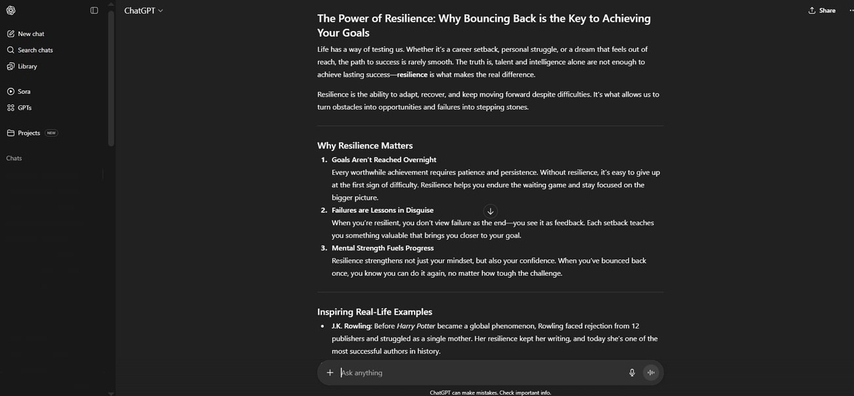
2. AI Art Prompt (FotorPea / MidJourney / Stable Diffusion)
Prompt: "A futuristic city skyline with neon holograms, glowing billboards, and sleek flying cars, ultra-realistic cyberpunk style."

3. Creative Story Prompt (ChatGPT / GPT Models)
Prompt: "Generate a fantasy tale about a young apprentice who discovers a dragon egg hidden in their village."
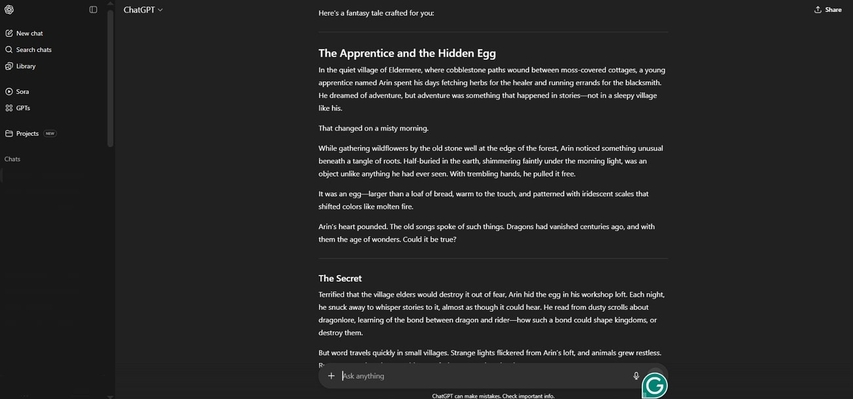
4. Character Illustration Prompt (Image Generation AI)
Prompt: "A young space explorer in a sleek astronaut suit, holding a holographic map, standing on a desert planet."
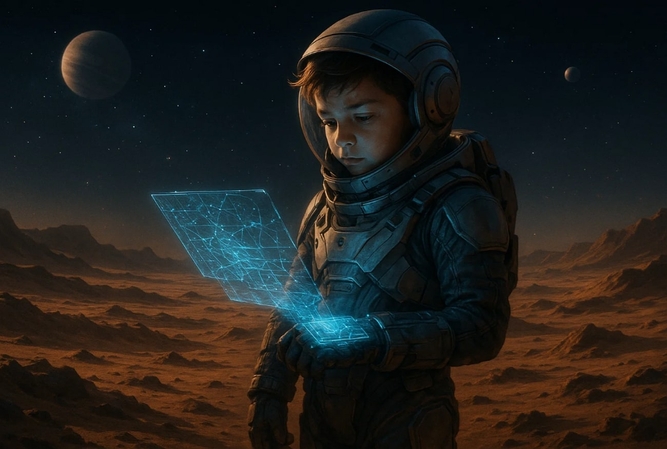
5. Marketing Visual Prompt (FotorPea/MidJourney)
Prompt: "A modern product mockup scene with soft lighting, white background, and a focus on a sleek smartphone design."
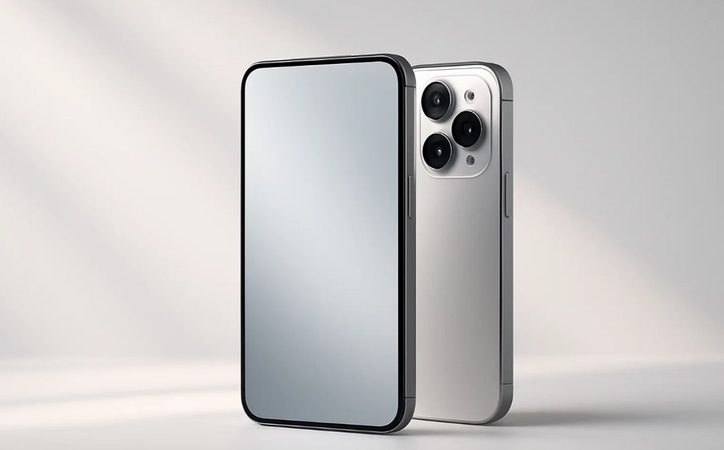
Part 5. Best Practices, Challenges, And Future of Prompt AI in Generative Models
After learning about OpenAI prompt engineering, you should be aware of the common mistakes that you should avoid and best practices for the best results:
Common Mistakes to Avoid When Using Prompt AI
To get high-quality and accurate results, we have listed down some mistakes that you should avoid while crafting prompts:
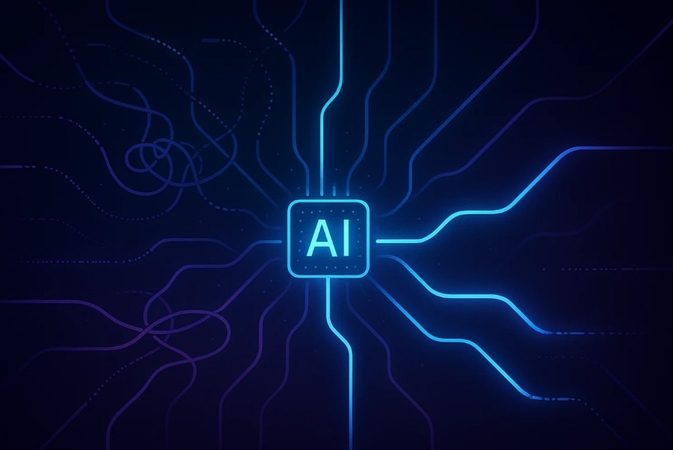
- 1. Overloading Prompts:Packing too many requests, details, or questions into a single prompt often confuses the AI, causing it to produce incomplete results.
- 2. Not Providing Enough Context:Mostly, people don't specify tiny details like background, and then AI tools generate themselves by assuming it.
- 3. Not Refining Prompts:The first prompt rarely delivers perfect results, so users don't alter the prompt according to them and generate wrong results.
- 4. Using Overcomplicated Language:Some individuals use complicated language and are unable to deliver the exact point, resulting in wrong output.
- 5. Don't specify Output Format:People miss providing details like choosing image size and the number of outputs to generate.
Best Practices for Creating Effective Prompts
After knowing about errors, you should follow the following practices to generate highly accurate image generation prompts:
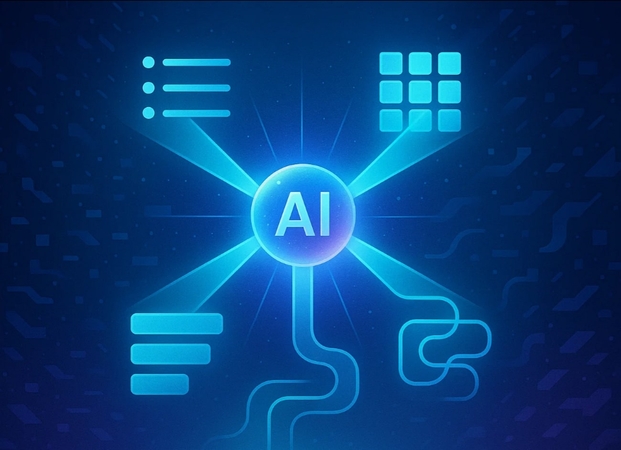
- 1. Be Clear and Specific:Users should provide clear instructions by stating exactly what result or format is expected.
- 2. Provide Context:One should provide the AI with relevant background, conditions, or examples to help it fully understand the task.
- 3. Keep Prompts Concise:Ensure that your prompts are concise and to the point; dragging them will result in misconceptions.
- 4. Structure Your Prompt:If your prompt has multiple parts, keep them in structure by using bullet points, numbered steps, or section headings.
- 5. Use Natural, Conversational Language:One should try to use basic language to describe their idea within the prompt for proper AI understanding.
Pro Tip. Mastering Prompt AI With HitPaw FotorPea's Advanced Image Generator
Suppose you want to generate a visually appealing image, and you try to do so using a Midjourney or diffusion model. Unfortunately, you found these tools a bit complex and weren't able to generate the required images. In this situation, we recommend using HitPaw FotorPea (formerly HitPaw Photo Enhancer), which lets you generate images by simply providing a text prompt like "vibrant neon cityscape at dusk, cinematic lighting".
Key Features
- 1.Gives the ability to select the number of outcomes you want to generate.
- 2.Let you choose the desired canvas ratio of the to-be-generated AI result.
- 3.Provides a Preview option to examine the generated result before downloading it.
- 4.Offers an upscale tool, upscale the images up to 8x without ruining their actual quality.
- 5.Allows restoring the original quality of a pixelated image by using the Image restorer tool.
Step-By-Step Guide to Using FotorPea for Prompt AI Image Generation
Upon hearing basic features of these tools, let's explore a detailed stepwise guide to use HitPaw FotorPea below:
Step 1. Choose an AI Generator to Generate Stunning Images
After launching the tool, click on the "AI Generator' to start generating visually appealing images.
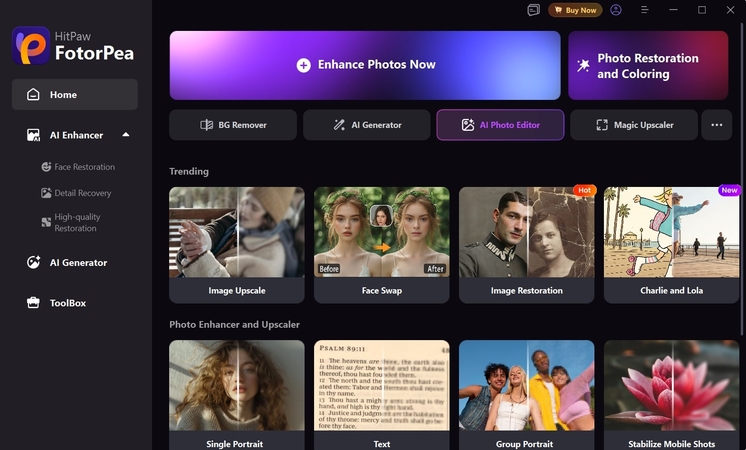
Step 2. Select Desired Mode, and Add Text Prompt
Now, click on the "Text-to-Image" mode, write a detailed prompt, and tap on the "Generate" button to get the process started.
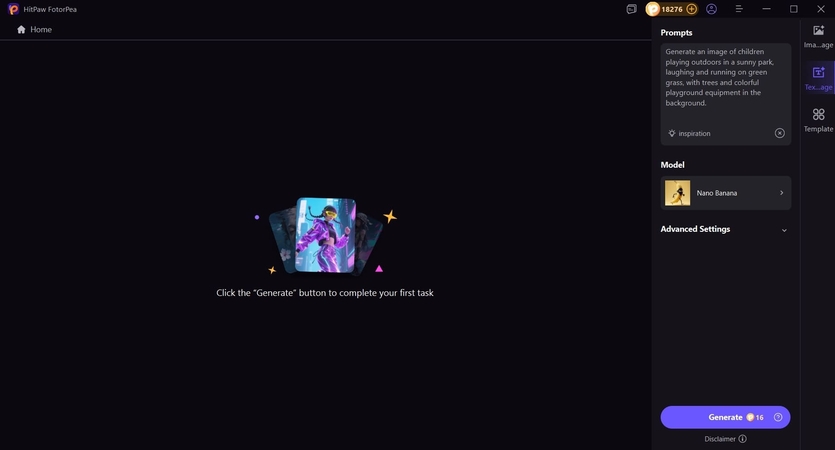
Step 3. Render the Generated Outcome to the Device
Finally, as the pictures have been generated, you can export by clicking the "Download" icon on the image.
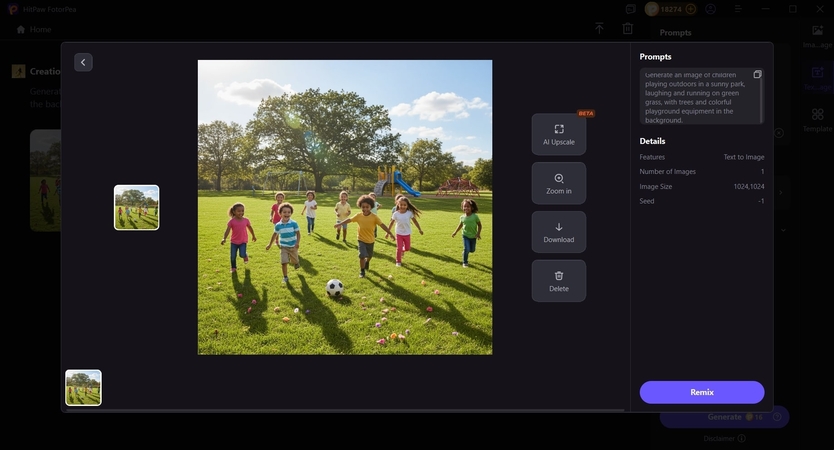
Conclusion
Summing up, in this article, we have provided you with all the necessary information about prompt AI along with its examples. However, if you want a beginner-friendly solution, we recommend using HitPaw FotorPea, which provides you with advanced features of the AI Generator.
Leave a Comment
Create your review for HitPaw articles


